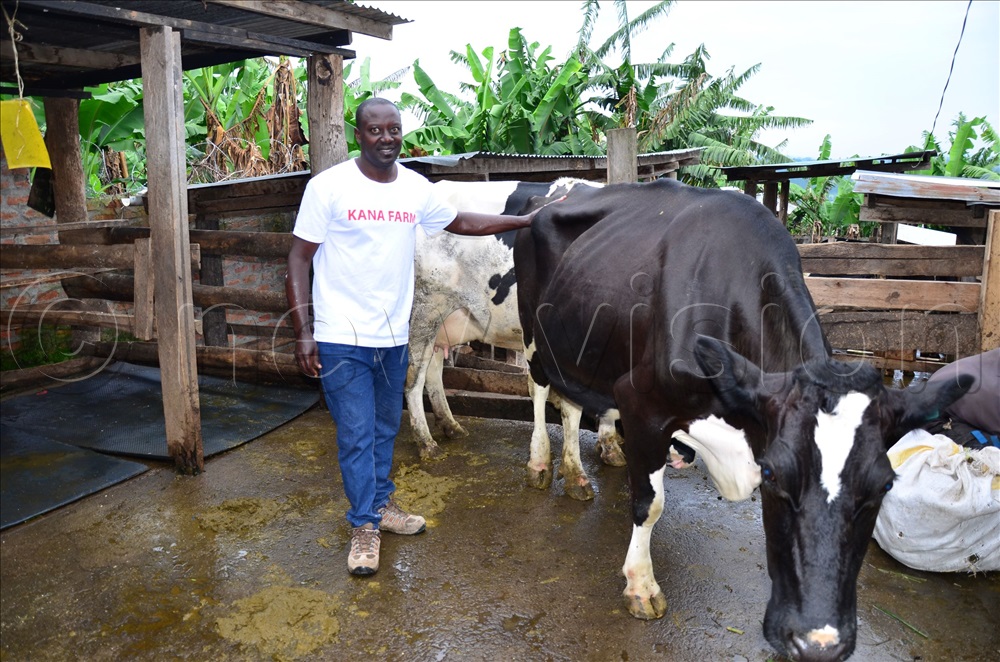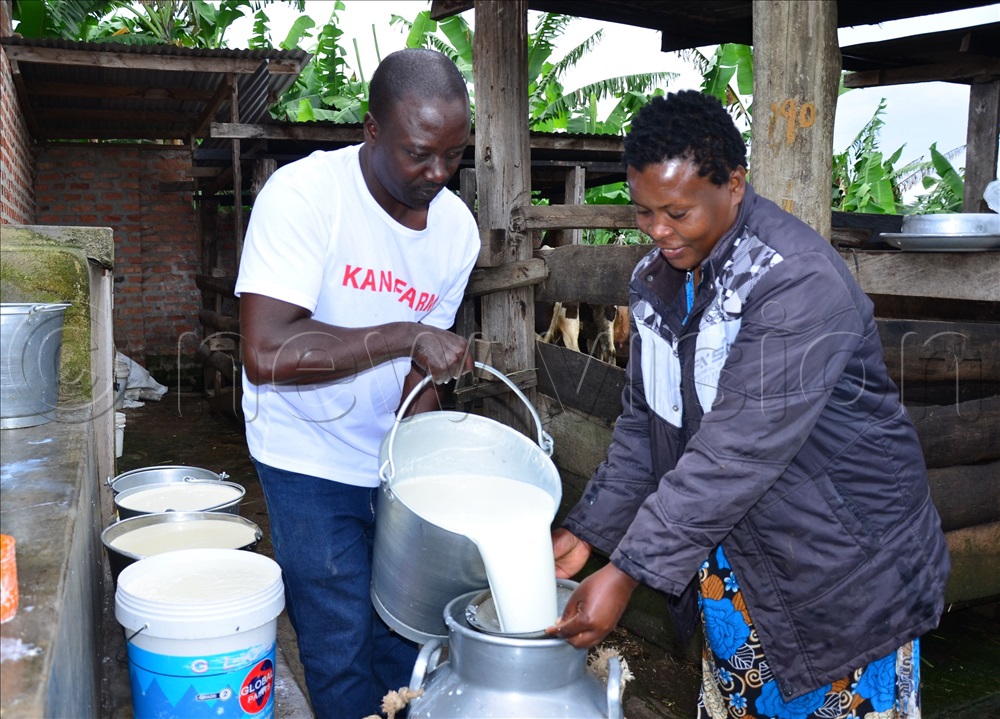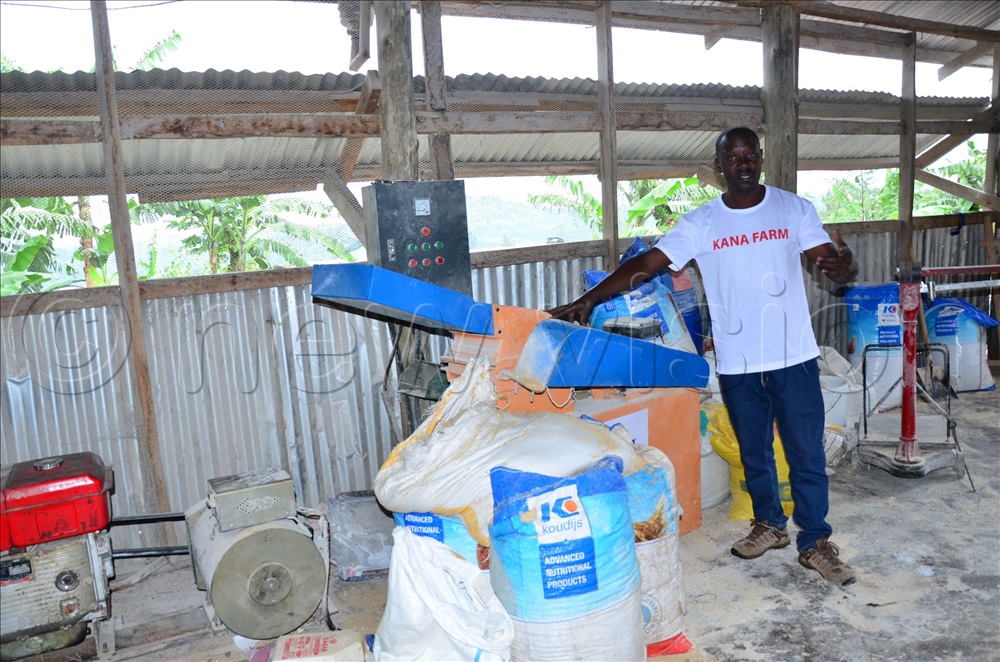For the tenth year running, Vision Group, together with the Embassy of the Netherlands, KLM Airlines, dfcu Bank and Koudijs Nutrition BV, is running the Best Farmers Competition. This year’s competition is running from April to November, with the awards in December. Every week, Vision Group platforms will publish profiles of the farmers. Winners will walk away with sh150m and a fully paid-for trip to the Netherlands.
Richard Nyakaana’s story is one of remarkable growth — from a small gift of two chickens to a thriving agribusiness, Kana Farm is a model for sustainable agriculture, inspiring others to follow in Nyakaana’s footsteps.
At the farm located in Rwengaju village, Kabarole district, 40-year-old Nyakaana believes in quiet transformation, creating impact without seeking attention. His farm is known for producing quality poultry, dairy, feeds and training.
Nyakaana was a student when his father passed away, leaving behind not just grief but the uncertainty of how his family would cope. Four days after the burial, his father’s old friend came to visit. He had no money or big promises to offer.
“Nyakaana,” he said, “you are a clever boy. I don’t have money to help you with school, but I can give you these two chickens. Find your way from there. Take care of the chickens; maybe sell the eggs, raise more birds and buy your uniforms.”
Nyakaana kept the chickens in a mud-and-wattle shelter and the chickens multiplied, reaching 17 at one point. However, disaster struck; floodwater washed away 10 of the chickens.

Despair crept in, but only for a moment, as Nyakaana did not give up. By August 2008, he had 50 local chickens. A few years down the road, while still a student at Mpanga Secondary School, Nyakaana began to think beyond subsistence.
Every afternoon after school as he walked back home, he studied the roasted chicken market. He observed that most vendors were selling broilers.
Additionally, the demand for exotic chicken was high in urban areas, while hotels and restaurants reserved local chicken for a few dishes.
“I realised there was a market for broilers, and I wanted to tap into that. I had to change my strategy,” Nyakaana says.
To get the means to scale up, he approached a small farmers’ group, seeking a loan. His request was rejected because he was not a registered member.
About the same time, a radio programme aired, calling Rwengaju one of the poorest villages in Kabarole district. Nyakaana and his fellow students were outraged.
They confronted the district production officer, Dr Thomas Nsemerirwe, demanding answers. He said low education levels, poor income and land shortages were crippling their area.
Dr Nsemerirwe also posed a challenge: “Young people must rise and change the image of this village.”
Nyakaana awakens
That conversation awakened Nyakaana. He went back to the farmers’ group, armed with a plan and confidence. He offered his chickens as collateral for a loan and pointed to his small piece of land as proof of commitment.

Nyakaana was convincing enough that the saving group’s chairperson, George Rwemofara, approved his loan of sh1m.
With that capital, Nyakaana bought 200 exotic chicks and improved his poultry shelter.
He set up a six-week cycle for the project that included brooding, selling and reinvesting.
Turning point
In 2010, President Yoweri Museveni visited Kicuna village, 5km from Rwengaju village.
Nyakaana and 17 of his schoolmates skipped class to attend the rally.
He heard the President speak about wealth creation through a four-acre farming model that included growing coffee, food crops, pasture and having a livestock enterprise.
“It was a good message and although I did not have four acres, I had a dream,” he says.
Since then, Nyakaana has not only grown Kana Farm into a model enterprise, but has also stood as a testimony of what is possible when youth do not let poverty define them.
The farm has livestock, horticulture and aquaculture units. All are designed for sustainability, high productivity and to uplift the surrounding community.
Geoffrey Mutegeki, a resident of Rwengaju village, says Kana Farm is one of the most diversifi ed and impactful farms in Kabarole district.
Earnings and expenditure
The poultry section runs like a factory, with 120 trays collected daily.
“Each tray is sold at sh11,000, so we earn sh1,320,000 from eggs alone, every day,” Nyakaana says.
They have to make daily investments to keep the enterprise running.

“We spend sh700,000 daily on feeds. Water, electricity and other utilities take sh70,000, and worker wages and bio-security expenses cost about sh250,000 per day,” he says.
Nyakaana says the total daily expenditure is sh1,020,000.
“That leaves us with a net profit of sh300,000 per day,” he says.
Dairy farming
The farm has 10 friesians and eight of these are milking, totalling 150litres daily. Of these, 135 litres are sold to Kidawalime Bakery in Kabaroledistrict.
The remaining milk is used on the farm, either for calves and sometimes it goes to their farmer association. The cows do not feed on leftovers.
“We invest in their diet,” Nyakaana says.
“We buy sweet potato vines, hay, dry Napier grass and silage. One truck of sweet potato vines costs sh10,000. On average, the total daily expenditure for the dairy unit — including feeds, labour and water — comes to sh60,000.”
Nyakaana does not let cow dung go to waste. “We dry it, crush it and add it to chicken feeds,” Nyakaana says.
How the farm makes money
Nyakaana’s farm operates under a well-structured financial plan that earns money from four key projects; feed production, sale of waste, livestock sales and dairy.
Each project has a clear purpose, feeding directly into the farm’s daily, monthly, seasonal or annual financial needs.
Regarding production, they manufacture 1,000kg of feed daily. Of these, 700kg are used on the farm and the remaining 300kg are sold to other farmers.
Nyakaana says each kilogramme is sold at sh1,850, generating a consistent daily net income of sh100,000.
All waste from the poultry and cow units is collected and sold as manure. Each month, two Fuso lorries of manure are sold at sh300,000 each, generating a total of sh600,000.
This income goes towards personal upkeep, covering Nyakaana’s travel, fuel and charity. The third revenue stream is the sale of ‘off-layers’.
When a chicken’s egg-laying production drops to 70%, it is sold as an “off-layer”. These chicken are sold seasonally in batches of 1,000, each fetching between sh15,000 and sh20,000.
This revenue caters for school fees, ensuring consistent education support for dependents. The fourth stream is the sale of at least four in-calf heifers every year, each going for sh6m.
These heifers are raised for two years and artificially inseminated before sale. The annual income of sh24m supports development projects like land acquisition, infrastructure expansion and other investments.
Best management practices
Kana Farm is officially registered with the Uganda Registration Services Bureau, giving it legal recognition.
“It makes it easier to apply for grants, build trust with customers and partners, and tap into larger markets. It gives us legitimacy and positions us for long-term sustainability.”
Its products include chicken feeds, hay and dried manure, all of which are branded before sale. The farm has structures to ensure smooth operations and continuity.
Nyakaana handles strategy, while his wife, Mery Goretti Karungi, manages finances. Their son, Treasure Arnold, oversees records during school breaks. The farm employs 10 staff who also run a savings group.
Nyakaana plans to register the venture as a family business to ensure continuity and shared ownership. To ensure physical security, several measures have been put in place.
“We have two full-time guards, CCTV [closed circuit television cameras] in key areas, and a fence all around,” Nyakaana says.
In 2021, Nyakaana received the Tooro Inspirational Award for excellence in agriculture and agribusiness. PLANS Last year, the couple acquired 10 acres in addition to the 1.5 acres where the farm is currently operating.
“We intend to start growing pasture like Napier grass and lucerne,” Nyakaana says.
10,000 birds, zero waste
In 2020, Richard Nyakaana modernised his poultry enterprise after realising the need for efficiency.
He underwent training by a poultry expert before upgrading.
“Proper spacing, waste management and ventilation were key lessons I applied,” Nyakaana says.
Today, the farm has 10,000 layer chicken housed in two houses, one of which is storeyed.
These structures are roofed with iron sheets and have proper spacing between them to allow easy access, while minimising the spread of diseases. With 10,000 layer chicken, nothing goes to waste; manure is sold as fertiliser on the farm.
Nyakaana uses deep litter system and maintains strict bio-security protocols.
Each house operates independently with its own water supply, automatic drinkers, feeders, and troughs that are never interchanged, preventing cross-contamination. Staff are trained to avoid moving equipment or tools between the houses.
Lighting schedules are managed carefully to maximise laying efficiency. To manage the feed costs, a processing unit was set up on the farm.
“Relying on commercial feed made me vulnerable to market fluctuations and inconsistent quality, so I decided to control the process from start to finish,” Nyakaana says.
Courtesy of the factory, farm costs have been cut by 30%, he says.





